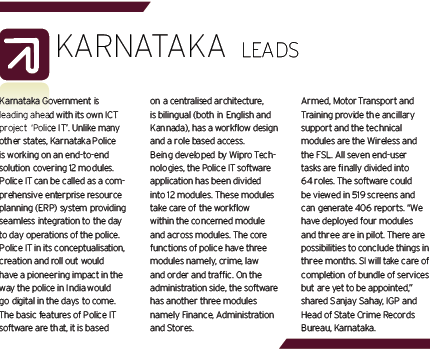
project guidelines

MHA has issued guideline for the appointment of System Integrators (SI) for the migration of CIPA and CCIS police stations and higher offices to CCTNS. SIs would execute the migration of the police stations and higher offices currently operational on CIPA and CCIS to CCTNS. NCRB is the nodal agency looking after the project implementation and monitoring.
Even though cctns is not a panacea for all policing related issues, it is expected to transform the existing state of policing and police and citizen interface

By Pragya Gupta, eGov Bureau
Installing surveillance cameras, installing computers and other information and communication technology (ICT) resources are not enough to make the policing efficient and effective. The current state of policing is marred with lack of objectivity, accountability, transparency, integrated approach, information and intelligence sharing mechanism, inter alia.
In immediate past, India has witnessed a spate of terror attacks in different parts of the country. Despite the urgency of information and intelligence sharing between states and respective security agencies, there was no mechanism in place through which a seamless information sharing could be made an integral part of the agencies operations.
To deal with these challenges and reform the working of Police forces across states and UTs, Ministry of Home Affairs has come up with Crime and Criminal Tracking Network and Systems (CCTNS). It has been made a state mission mode project under National e-Governance Plan (NeGP) to modernise the police force giving top priority to enhancing outcomes in the area of crime investigations and criminal detection, in information gathering, sharing among various police organisations across the country and in enhancing police and citizen interface. If implemented completely, CCTNS can emerge as an overhaul of the way policing is being done in India.
 Loknath Behera
Loknath Behera
IGP, National Investigation Agency (NIA)
“CCTNS will increase the efficiency of the police through better data management, time management and knowledge and skill management”
Commenting on the need for integrated sharing between police departments across the country, Prakash Kumar, Director Internet, Cisco Systems India, “In an event of terrorist attacks, the most essential thing is to disseminate the real-time information about the event and channel it to the authorities and to have a reliable G2G communication network.”
Project history
CCTNS intends to provide an integrated application software platform and creation of a nation-wide networked Police infrastructure connecting more than 14,000 police stations and nearly 6000 higher offices in 28 States and 7 UTs of the country and enabling seamless information sharing. The need of IT in Police was never ignored earlier, it started with NCRB’s projects like Crime and Criminals Information System (CCIS) and Common Integrated Police Application (CIPA). However, the importance and need of real time information sharing has been realised in recent years.
All these initial projects focused primarily on collection of data and automation of Police Stations. While CCIS was launched in 1990, it focused exclusively on creating a national level database of crime and criminals.
However, duplication of efforts, lack of motivated staff and network connectivity for information sharing emerged as major hurdles in execution of the project. Conceptualised by Ministry of Home Affairs (MHA) in 2004, CIPA had a core focus on automation of police stations. Later, it was felt that a standalone application cannot provide the enhanced outcomes in the areas of crime investigation and criminal detection.
Eventually, to provide an upward integration of the Police station databases – to the District and state headquarters and a better public delivery system, MHA came up with `2000Crore project, CCTNS. Loknath Behera, IGP, National Investigation Agency (NIA), “CCTNS will increase the efficiency of the police through better data management, better time management and better knowledge and skill management. So, police will be more efficient, which is the first requirement in security.”
It will enable security agencies to keep track of the progress of the crime and criminal investigation and prosecution cases, including progress of cases in the courts and will also help in reduction of manual and redundant record keeping.

Implementation
The CCTNS project includes vertical connectivity- linking police units at various levels within the states – and as well as horizontal connectivity which involves linking state headquarters and the central headquarters to external entities. To provide this link, Wipro Technologies has been selected as the agency which would develop the core application software (CAS) to be used by the states and another core application to be used by the Centre for digitisation of crime and criminal records.
The solution is being developed on multiple technology platforms to address different levels of functionality required at the centre and state. Once implemented, the application will link the State Crime Record Bureau (SCRB) with the National Crime Records Bureau (NCRB). It would facilitate real-time information sharing between states and the Centre.
MHA has issued guideline for the appointment of System Integrators (SI) for the migration of CIPA and CCIS police stations and higher offices to CCTNS.
SIs would execute the migration of the police stations and higher offices currently operational on CIPA and CCIS to CCTNS. NCRB is the nodal agency looking after the project implementation and monitoring.
State updates assam:
Assam has received `26 lakhs for the financial year 2010-11, towards funding for strengthening infrastructure at RTS/PTC. An agreement has been made for State Project Management Consultant (SPMC) between Assam police and IL&FS. State’s Nodal agency, AMTRON, started IT Basic Training Course to the police personnel. Assam Police has signed an agreement with HCL Infosystems for supplying of hardware and peripherals.
ManIpur: Manipur government has selected Leasing and Financial Limited (IL&FS) as SPMC for the implementation of CCTNS.
Rajasthan: Capacity building module is under execution under the state CCTNS project. In April 2010, training centres across 41 districts in state were set up to educate the cops about computers and imparting basic IT literacy. Updating on the progress of work under CCTNS, A Paunnuchami, IGP, Nodal Officer, SCRB, Rajasthan informs, “Seven days training is being given out to the cops.
Till now, 16,000 police personnel have under gone training. We have deputed 250 cops as trainers to these district centres, five cops at each district centre.
These cops belonged to the in-house pool of 2000 IT literate cops, who were shortlisted for the same. These 250 cops, too, were trained before they get on their job.”

Challenges
Not every police station has a broadband connectivity. Connectivity is a major challenge in difficult regions like dense forest, hills etc. In India power deficiency also poses difficulties for long term connectivity.
One of the major challenges is resistance for change among the people or attitudinal change in the policeman. From last five years, police training includes computer literacy but those who have passed out before this face challenge to get them fitted into a new era of ICT.
Fund flow is also a major concern. Centre will support this project for three years after which states will be responsible for its operation and maintenance.
Effective data integration at all the levels is one of the most important challenges. At the state level, envisioning by state to integrate an ongoing evaluation system that monitors the effectiveness of daily operations and allows responding to problems and making midcourse corrections in a timely fashion for this project, is of utmost importance and achieving it is a big challenge.
Since, the project deals with a great amount of information related to the authorised Police personnel, hackers may be able to compromise the system, leading to anything from data breach to loss of data. The system has to be designed with confidentiality, integrity and accountability as the highest priorities.
Be a part of Elets Collaborative Initiatives. Join Us for Upcoming Events and explore business opportunities. Like us on Facebook , connect with us on LinkedIn and follow us on Twitter, Instagram.











